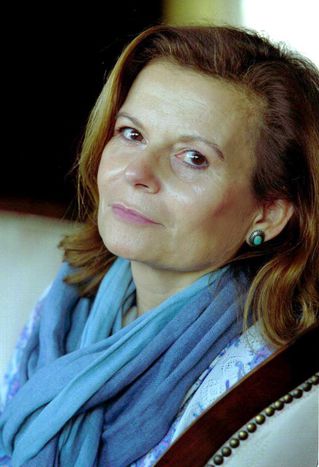
Carme Riera: why Catalan’s 'days are numbered'
Published on
Whilst in Lisbon for BeBalears, the Balearic Islands cultural week, the Barcelona-based writer and Spanish literature professor discusses how she struggled to write in her native tongue and analyses the erasmus effect
In early March Lisbon hosted a cultural exhibition in honour of the Balearic Islands, which was organised for the second time in a European capital by the Cataluny Apresenta association. It's easy to sneak into the packed room of spectators at the University of Lisbon, where Carme Riera Guilera is speaking. Here's a quick summary of what she says: the Palma-born writer's work has recently been translated into Portuguese, though she is saying that she doesn't have the courage to re-read her own books. The 62-year-old even claims not to remember her characters sometimes. Another assertion she makes is that no matter how much an author writes, every word left on the page becomes the property of the reader in every way. 'The reader must own the book!' she is exclaiming. 'You can't choose a reader, and sometimes you can't even imagine who might read your work or be interested in what a writer produces.' Like an infamous pilot who invited her into the cockpit to autograph her award-winning novel, Dins el darrer blau ('In the Last Shade of Blue', 1994) for him. Nervously, she tried to convince the pilot to leave off reading and concentrate on the plane. The pilot explained that an aeroplane works on auto-pilot; the analogy suited her. As a writer, once she launches a book, she also feels forced to hover in the void she says, only able to take command again at the moment the book hits the public.
Carme Riera on Catalan and its use today
Though Riera started writing at a young age, she was already sixteen when a teacher encouraged her to start using the language in which her grandmother used to tell her stories, and which she used to speak with friends and family: Catalan. Riera's childhood dream was to be a doctor, but studying literature was practically imposed on her; in that period, it was the only way in which a girl of her age could occupy herself. 'Even now I have to correct myself in Catalan,' she adds, though her hard work has paid off. Riera was eighteen when she moved to Barcelona to study spanish philology at the Autonoma university; Catalan classes were reduced to only one course, putting it on the same level as any foreign language. It led to her studying Portuguese instead. 'I love their good manners and friendliness,' Riera says about the Portuguese citizens. 'Plus, Lisbon is magnificent.'
Moving the subject back to Catalan, Riera suggests that the language's 'days are numbered'. If it were not so, why feel the necessity to defend a language and accordingly a culture? The pressure of other languages which are stronger on paper - like English or Spanish - make the Catalans fear a sweet and slow death of their mother tongue, though it is a language rich in variety and practically unknown traditions. Of course, the eternal image of the parochial Catalan-speaker who only speaks in Catalan, hates Spanish and is generally a very closed person is not a true representation. Catalans are sociable and open, and one must know how to understand and discover this people through the past and the present. After all, language is no longer a fundamental identifying element. Decades ago, it was an important cause in the battle of a generation, a generation who were forced toexclusively study another language aside from their own. Catalan was a shield of opposition to the fallen dictator Franco. Today you can study Catalan, but it's not the same. 'In my day Spanish was spoken in the front room and Catalan was spoken in the back yard. Now it's the opposite!' she concludes, sipping a glass of port.
Most erasmus students in Barcelona learn Catalan and Spanish
In any case, CatalunyApresenta is doing a good cultural PR job to make a sometimes neglected archipelago more known to Europe, even if it is paradoxically very highly visited. The exhibition in general provides a wider perspective of the Balearic Islands and the Catalan-seaking countries and their cultural wealth. 'More space should be given to the unknown,' Riera says, referring to the weaker languages and cultures which are in need of support.' For example, many of my erasmus [European university exchange] students [at the Autonoma university in Barcelona] are astounded after their first linguistic contact with the Catalan reality,' she adds. Some barely know of the existence of the language, whilst others think that using Spanish will be enough to live in and visit the region. 'But, the majority of foreign students finish the year speaking both languages. It's a privilege.' If you can attribute a different vision of the world to every language, Spain - where there are four official languages amongst others - becomes a very rich country. Here, it's possible to speak multiple languages at the same time and thus of having a wider vision of the world.
(Images: ©Pelòdia; Alexandra Guerson/ courtesy of Flickr; video/ ©virtualnewsSL; ©ib3/Youtube
Translated from Carme Riera: «il catalano ha i giorni contati»



